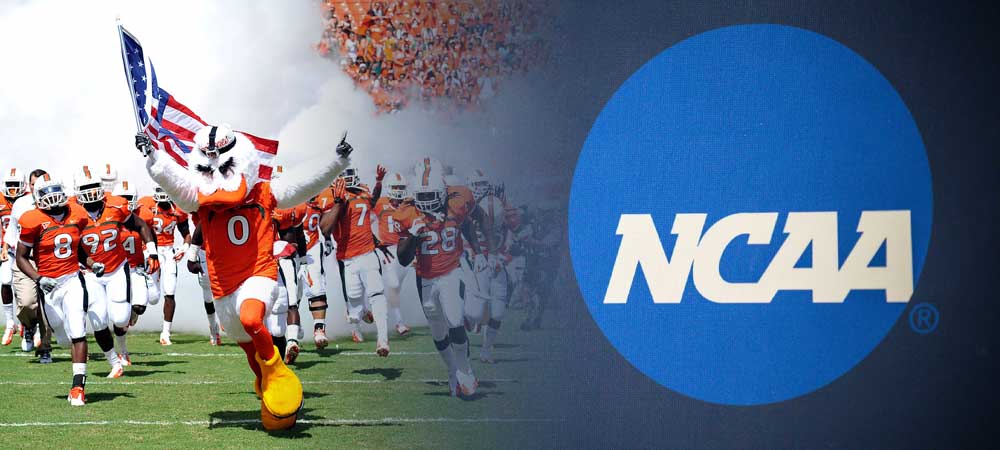- The NCAA approved nationwide name and image likeness rights for athletes, meaning that NCAA athletes can now profit off their image.
- These new rules likely won’t allow for sports betting endorsements or for players to associate with any products that might hurt the NCAA’s brand (alcohol, tobacco, etc.)
- Players can’t be associated with their team and can’t appear in uniform in these endorsements, and endorsements can’t be based on a player’s athletic accomplishments.
- The NCAA recommendations would also prohibit new college sports video games.
INDIANAPOLIS – The NCAA made a change on Wednesday by approving name and image likeness rights for college athletes. NCAA athletes in all sports can begin signing endorsement deals and profiting off their image in 2021.
These rules won’t be exclusive to money sports like college football and college basketball but will apply to all athletes regardless of sport. The NCAA and its member institutions will not be paying athletes directly.
The rules governing these new name and image likeness (NIL) rights haven’t been cemented yet, but the chances of sports betting firms being included seem remote. A report published by a working group chosen by the NCAA Board of Governors recommended that the Board consider:
“Whether certain categories of promotional activities (e.g., alcohol, tobacco and sports gambling) should be precluded because they are inconsistent with the NCAA membership’s values.”
While this is just a recommendation of “consideration”, the language makes it clear that there is little room for debate, and sports betting endorsements seem extremely unlikely.
The NCAA as an organization takes a hardline stance against gambling.
Some thought that with the financial crisis of the Coronavirus pandemic, the NCAA might embracing legal sports betting to bolster its strained finances, but that doesn’t appear to be happening.
What Kinds Of Endorsements Can Athletes Sign?
As always, the NCAA has found a way to act sanctimonious about a rule change that was all but legally mandated.
While athletes will be able to sign endorsements, including with boosters of their school, they can’t be wearing school colors or logos, and the endorsement deal can’t be based off a player’s on-field accomplishments.
This restriction ostensibly exists to prevent big programs like Ohio State and Alabama from using their vast financial resources to gain a competitive advantage over smaller, less valuable programs. This includes a ban on using endorsement deals as inducements for incoming high school recruits.
As The Athletic’s Andy Staples described it: “[The NCAA] will continue to go through the motions of protecting a notion of parity that has been hilariously refuted by every college football season that has ever been played.”
Instead, endorsements might be more akin to those of social media influencers: players using their individual image and reach to promote lifestyle products, athleticwear, energy drinks, etc.
All endorsement contracts signed will be reviewed by the NCAA before they are approved. The organization will presumably maintain the right to veto or void any contract if it includes disagreeable terms or language.
This result will likely be a cavalcade of lawsuits from disgruntled players whose contracts were voided.
Will The NCAA Video Game Return At Least?
The NCAA bricked perhaps the easiest public relations layup of all time with these new rules by not including provisions for a new college football video game.
Many fans who don’t care at all about NIL rights do care about getting their hands on a new NCAA Football game but opening the door for a licensed video game would have likely meant allowing players to collectively bargain for their representation in the game.
That presents a problem to an organization tasked with managing a multi-billion-dollar college sports industry while simultaneously promoting the notion that its athletes are amateurs.
Players could potentially negotiate individually with EA Sports or another video game publisher, but the rules seem to indicate that they would not be allowed to appear in uniform or be directly associated with their team.
Advertising Disclosure
In order to provide you with the best independent sports betting news and content LegalSportsBetting.com may receive a commission from partners when you make a purchase through a link on our site.
News tags: Alabama Crimson Tide | College Basketball | College Football | Coronavirus | COVID-19 | EA Sports | NCAA | NCAA Board of Governors | NCAA Football 14 | Ohio State Buckeyes

With a dual background in English and sports performance and business analytics, Carter aims to write stories that both engage and inform the reader. He prides himself on his ability to interweave empirical data and traditional narrative storytelling. When he isn’t keeping readers up to date on the latest sports betting legal news, he’s banging his head against a wall regretting his decision to be a Tampa Bay Buccaneers fan.


 Bitcoin Sports Betting Sites
Bitcoin Sports Betting Sites Best Online Sports Betting
Best Online Sports Betting Famous Sports Bettors
Famous Sports Bettors States With Legal Sports Betting
States With Legal Sports Betting Sports Betting Events
Sports Betting Events




